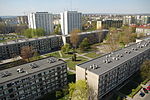Pedagogical University of Cracow

The Pedagogical University of Cracow (Polish: Uniwersytet Pedagogiczny im. Komisji Edukacji Narodowej w Krakowie, UP), is named after the Commission of National Education created by King Stanisław August Poniatowski. It is a public university located in Kraków, Poland. It was founded soon after the conclusion of World War II, on May 11, 1946 originally as the National Higher College of Teacher Training. Its aim is the training of highly qualified teaching staff for the Polish educational system. The Pedagogical University is the earliest Pedagogical University in postwar Poland. It functions according to the model of integrated education combining theoretical knowledge with practical skills. The mission of the University is reinforced in scientific research and development according to the highest European standards in several dozen fields of studies. It runs first-cycle (Bachelor's) and second-cycle (Master's) degree programmes, as well as in the third-cycle degree studies (Ph.D.), and post-graduate study courses.
Excerpt from the Wikipedia article Pedagogical University of Cracow (License: CC BY-SA 3.0, Authors, Images).Pedagogical University of Cracow
Podchorążych, Krakow Krowodrza (Krowodrza)
Geographical coordinates (GPS) Address Website External links Nearby Places Show on map
Geographical coordinates (GPS)
| Latitude | Longitude |
|---|---|
| N 50.073461111111 ° | E 19.908761111111 ° |
Address
Uniwersytet Pedagogiczny
Podchorążych 2
30-084 Krakow, Krowodrza (Krowodrza)
Lesser Poland Voivodeship, Poland
Open on Google Maps










